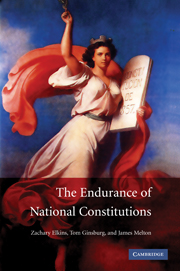Book contents
- Frontmatter
- Contents
- Preface
- 1 Introduction
- 2 How Long Should Constitutions Endure?
- 3 Conceptualizing Constitutions
- 4 What Makes Constitutions Endure?
- 5 Identifying Risks to Constitutional Life
- 6 An Epidemiological Analysis of Constitutional Mortality
- 7 Cases of Constitutional Mortality, Part I: Similar Contexts, Contrasting Outcomes
- 8 Cases of Constitutional Mortality, Part II: Contrasting Contexts, Similar Outcomes
- Conclusion
- Appendix
- References
- Index
- References
7 - Cases of Constitutional Mortality, Part I: Similar Contexts, Contrasting Outcomes
Published online by Cambridge University Press: 05 June 2012
- Frontmatter
- Contents
- Preface
- 1 Introduction
- 2 How Long Should Constitutions Endure?
- 3 Conceptualizing Constitutions
- 4 What Makes Constitutions Endure?
- 5 Identifying Risks to Constitutional Life
- 6 An Epidemiological Analysis of Constitutional Mortality
- 7 Cases of Constitutional Mortality, Part I: Similar Contexts, Contrasting Outcomes
- 8 Cases of Constitutional Mortality, Part II: Contrasting Contexts, Similar Outcomes
- Conclusion
- Appendix
- References
- Index
- References
Summary
“All happy families are alike,” began Leo Tolstoy in Anna Karenina (1877), “but every unhappy family is unhappy in its own way.” Certainly, the last three chapters remind us of the multiple sources of unhappiness in constitutions. Perhaps, however, our focus on failure has obscured the qualities of stable constitutions. Is it that elderly constitutions have simply avoided all of the crises and disabilities that afflict the more fleeting systems? Is there something about them that defies epidemiological analysis? A biographical account of these longer lives seems in order. Even among the unhappy cases, we still have large gaps in our knowledge. How exactly do certain crises destabilize constitutions? How, if at all, do the design features whose therapeutic effects we praise actually work in practice? Case-level material can be insightful for a host of reasons. The next two chapters explore constitutional reform (and non-reform) in two groups of case-oriented analyses. As we describe in the following section, we have adopted a case-study design that, in our view, illustrates the concepts and processes under consideration and maximizes analytic leverage on the challenge of causal inference.
A STRUCTURED CASE-STUDY APPROACH
A close inspection of cases provides a number of distinct analytic advantages. Most obviously, such analysis can illuminate the causal process, something that is sometimes lost in large-n statistical analysis that follows a less sequential evaluation of the association of cause and effect.
- Type
- Chapter
- Information
- The Endurance of National Constitutions , pp. 147 - 178Publisher: Cambridge University PressPrint publication year: 2009



